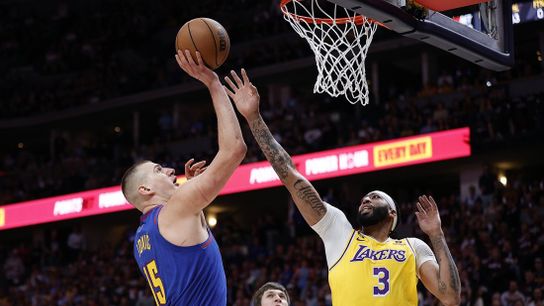The Los Angeles Lakers initially looked tired. The Lakers later looked energetic. The Lakers initially appeared overwhelmed with the Denver Nuggets’ dominance. The Lakers later appeared resilient enough to overcome it.
Unlike in their previous playoff series, the Lakers failed to throw the first punch in their 132-126 loss to the Nuggets in Game 1 of the Western Conference Finals on Tuesday. Just like what they showed against Memphis and Golden State, however, the seventh-seeded Lakers still proved they have what it takes to challenge another championship contender.
At first, the Lakers looked gassed while playing in the city’s high altitude. Later on, the Lakers regained their second wind. At first, the Lakers played as if they would allow Nuggets’ center Nikola Jokic to run them out of the building. Later on, the Lakers countered with a dominant Anthony Davis. At first, the Nuggets’ depth became too much to handle. Later on, the Lakers showcased their own. At first, the Lakers trailed by double digits for most of the game. Later on, the Lakers kept chipping away enough to reduce the Nuggets’ lead to single digits in the game’s final minutes.
So, what should the Lakers make of all of this?
Should they feel discouraged they couldn’t steal Game 1? Or should they feel encouraged they can follow up with a better performance in Game 2? Should they feel overwhelmed that Jokic will likely do anything he pleases as he did in Game 1 in points (34), rebounds (21) and assists (14)? Or should they feel empowered that Davis will bring out his best as he did in Game 1 with 40 points, 10 rebounds, three steals and two blocks?
Should they feel concerned that Denver’s team chemistry appears sharp among Jamal Murray (31 points), Kentavious Caldwell-Pope (21), Bruce Brown (16), Michael Porter Jr. (15) and Aaron Gordon (12)? Or should they feel confident that the Lakers have strong play among LeBron James (26 points, 12 rebounds, nine assists), Austin Reaves (23) and Rui Hachimura (17)?
Both the simple and complicated answer: the Lakers should feel all of these things. That might seem contradictory. That just exposes the nature of playoff basketball, though. A lot of murkiness often emerges as it did in Game 1, which suggests an unpredictable and tough series ahead. The good news? The Lakers have what it takes to win this series. The bad news? So do the Nuggets.
After stealing Game 1 on the road in Memphis and Golden State, the Lakers failed to do so against Denver. Some of that might seem expected, given the circumstances. By virtue of their record, health and chemistry, the Nuggets are significantly better than the No. 2 Grizzlies and No. 6 Warriors. It also often takes teams time to adjust to Denver’s high altitude. The Lakers practiced there the day before in hopes to mitigate that issue. Though that didn’t help them at the beginning of Game 1, the Lakers eventually adjusted and appeared energetic. Perhaps those elements won’t become as challenging in Game 2 and if the Lakers return to Denver for a possible Game 5 and Game 7. Still, the Lakers may experience additional fatigue with the condensed series featuring games every other day. Who knows how much that could strain a 38-year-old James or an injury-riddled Davis?
It does not appear Jokic will face any limitations with his heavy workload or conditioning. The Lakers often could do little to stop him. When Jokic heaved a contested 26-foot 3 at the end of the third quarter over Davis, the Lakers’ star simply shook his head to convey he defended the right way. When Davis guarded him closely on another possession earlier in the game, Jokic performed a simple spin move to throw him off balance before finishing at the rim.
Yet, the Lakers competed against Jokic in ways that enabled his dominance before further limiting it. Lakers coach Darvin Ham started guard Dennis Schroder for a second consecutive game in hopes to have a starting lineup. Ham presumably made this move in hopes to improve the team’s floor spacing and pace. The tactic left the Lakers vulnerable, though, in different ways. The Nuggets dominated the Lakers on the glass (47-30). Unlike when the Lakers had Dwight Howard and JaVale McGee to throw at Jokic to wear him out during their playoff series in the bubble, Davis received little interior help. Lakers forward Jarred Vanderbilt played only 10 minutes. Lakers center Wenyen Gabriel became a healthy scratch. When the Lakers sent smaller defenders to double team Jokic, he simply found open shooters that fueled strong marks from the outside (15-for-32). Once Davis became the help defender on Jokic, though, the Lakers had more effective speed bumps. Maybe this foreshadows a potential adjustment the Lakers will make in Game 2. Then again, it might not matter. Jokic has become a two-time MVP for a reason.
Typically, a team’s execution does not guarantee it will carry over into the following playoff game. For better and for worse, each game usually has its own identity. Nonetheless, each team can use Game 1 to determine which strategies and lineups worked in hopes to make the necessary adjustments in Game 2 and onward. In the Lakers’ case, they demonstrated in Game 1 they have what it takes to adjust and stay competitive. They also showed they are vulnerable against these Nuggets.
So strap up for the ride, Lakers fans. Who knows if this will end in turbulence or in excitement. Either way, the Lakers will fight to the very end.
